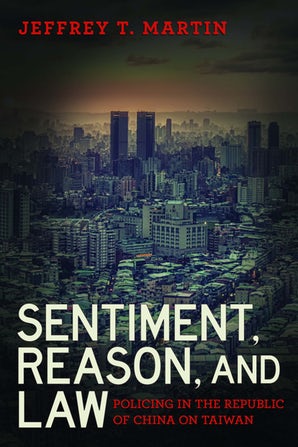What if the police were not independent from political interests? What if various citizens and influential figures constantly intervened in officers’ decision-making, influencing the outcomes and therefore preventing officers from dealing with the cases based on the rule-of-law ideal? And what if, finally, this “weakness” of the police institution was the result of an authoritarian past? In his theoretically thick ethnography, Jeffrey T. Martin provides the reader with counter-intuitive answers to those questions. Bringing multiple vignettes from his fieldwork together, he persuasively shows that our hegemonic notions of what police are and what police ought to be should be reconsidered.
Order is not something that should be en-forced, but rather an ideal that must be constantly and collectively negotiated.

Paradoxically and contrary to conventional wisdom, then, it is precisely the failure to abide by the rule-of-law ideal that helps the Taiwanese police keep society so peaceful.
In fact, Martin shows that because officers are driven by the imperative of repair, the law itself starts to be perceived as secondary and instrumental. “From the patrolman’s perspective,” Martin argues, “law is simply a thing used to create a link between misdeed and punishment” (p.125). Whether this link is activated, however, depends on the judgement of the officer and on the extralegal circumstances in which the officer negotiates the order with the others. Paradoxically and contrary to conventional wisdom, then, it is precisely the failure to abide by the rule-of-law ideal that helps the Taiwanese police keep society so peaceful, or, as Martin puts it: “illiberal qualities are vital to the way police maintain Taiwan’s democratic order with relatively low levels of violence” (p.2).
This repair work that Taiwanese police do, according to Martin, is fueled by the cultural notions of sentiment (qing), reason (li), and law (fa). In other words, officers tend to navigate the “complex plurality of powers” (p. 143) and, while doing it, are extremely careful to take into account not just the abstract demands of law, but also the “particular conjuncture of interests” (p.129, emphasis in original) that characterize any specific conflict that they may find themselves in. This puts Taiwanese police officers in a position where the sentiment and will of the participants has to be acknowledged and then gently molded into a compromise and consensus. It is important to note that “reason” is not aimed at creating universal principles of coexistence, but instead acts here as a “particularistic” molding tool: “The appeal to reason made by a patrolman in the course of managing conflict takes the form of a call to reflection on the part of the involved parties concerning their shared interest in resolving the specific conflict at issue” (p. 129). In other words, this is a form of police work that, contrary to what we can encounter in Western imaginations, “emphasizes affect and/or will over abstract reason” (p.133).
While the reference to specific categories of “sentiment” and “reason” could indeed characterize only certain police institutions, the practices of extra-legal and informal conflict resolution that those concepts denote could be found in a variety of places around the world.
It must be noted that Martin does a great job contextualizing Taiwanese police practices in the local history, looking at the development of the police institution both through the Japanese occupation of the island and through the rule of Kuomintang (KMT). In particular, he traces the weakness of the police institution (its lack of independence) and its reliance on cultural ideas about sentiment (qing), reason (li), and law (fa) precisely to those periods. However, as it often happens, the biggest weakness of the book can be found right where the book is the strongest: while the author roots Taiwanese police in peculiarities of the local history, he fails to connect the experiences of his participants to broader phenomena. For example, while the reference to specific categories of “sentiment” and “reason” could indeed characterize only certain police institutions, the practices of extra-legal and informal conflict resolution that those concepts denote could be found in a variety of places around the world. In my opinion, the book would benefit from more engagement with the rich literature on informalities (e.g. Ledeneva et al. 2018). This would allow the author to tell the reader not just the story about the police in Taiwan, but to connect it to certain tendencies that one can find in post-Soviet, Latin American, African and many other societies. After all, ethnography at its best always finds a way to make “sense out of human differences in terms of human similarities” (Agar 2006, 11).
After the murder of George Floyd and the ensuing public discussion about the place of policing in contemporary Western societies, it is extremely important to look critically at the Western fetish of “impartial” law enforcement and to carefully examine the alternatives that exist in numerous societies around the world.
Martin’s book does a great job at showing that police and the state can successfully function without striving to enforce laws at any cost. Given this, it is an extremely timely publication. After the murder of George Floyd and the ensuing public discussion about the place of policing in contemporary Western societies, it is extremely important to look critically at the Western fetish of “impartial” law enforcement and to carefully examine the alternatives that exist in numerous societies around the world. As Sentiment, Reason, and Law convincingly demonstrates, peace and harmony can be much better kept when police are weak, i.e., dependent on multiple wills, sentiments, and desires that they encounter during their work. This weakness makes police sensitive towards those that the institution deals with, and therefore prone to seek compromise rather than resort to force and violence. Perhaps the time has come for many modern societies to understand that order is not something that should be en-forced, but rather an ideal that must be constantly and collectively negotiated. Should we see order as an “intrinsically collaborative processes” (p.147), and not just as something that police do, we may find ourselves in a much less violent society.
Jeffrey T. Martin. 2019. Sentiment, Reason and Law: Policing in the Republic of China on Taiwan. Ithaca, NY: Cornell University Press. ISBN: 9781501740053
References:
Agar, Michael. 2006. “Culture: Can You Take It Anywhere?: Invited Lecture Presented at the Gevirtz Graduate School of Education, University of California at Santa Barbara.” International Journal of Qualitative Methods, 1–16.
Ledeneva, Alena V., Anna L. Bailey, Sheelagh Barron, Costanza Curro, and Elizabeth Teague. 2018. Global Encyclopedia of Informality: Understanding Social and Cultural Complexity. Volume 1. London, UK: UCL Press.
Featured Photo: Taiwanese police officer taking a rest, leaning on his riot shield- Photo (cropped) by tomscy2000 found on Flickr.(CC BY 2.0)
*****
This review is a response to our call for reviews on Law, Technology and Bureaucracy
We have already published reviews for Dispossessed, Uberland, Genocide Never Sleeps and The Gray Zone.









